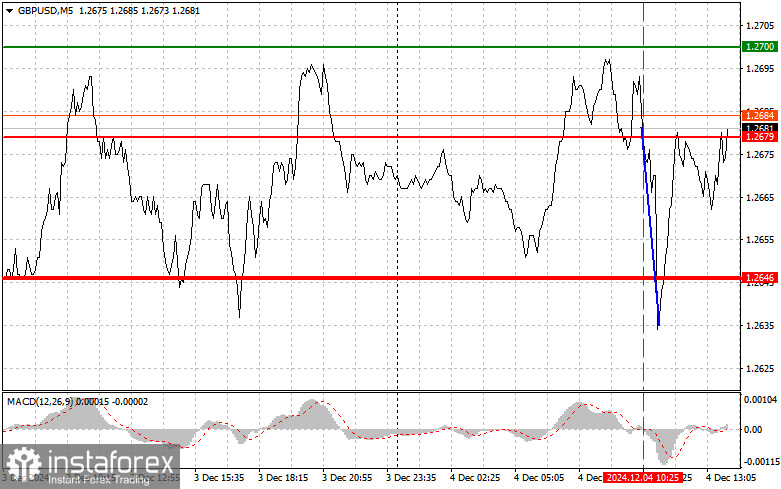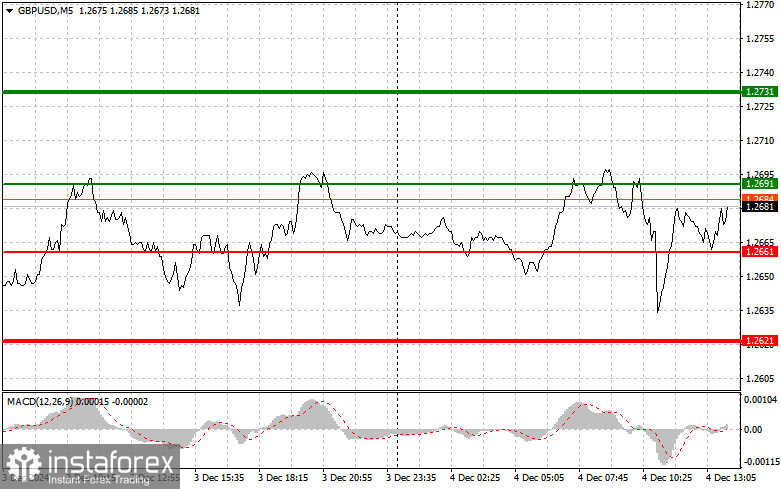Analysis of Trades and Tips for Trading the British Pound
Testing the 1.2679 level coincided with the MACD indicator starting to move downward from the zero level, confirming a correct entry point for selling the pound. This led to a decline in the pair by more than 40 points.
Today's reaction to the UK PMI data was quite unexpected. Economists are closely monitoring indicator trends that could signal potential changes in the Bank of England's monetary policy, though clarity is still lacking. Amid rising inflation and economic challenges, more investors lean toward the possibility of swift policy tightening. Currently, the pound demonstrates some resilience; however, US economic data could disrupt this.
Only strong reports on the PMI services index and composite index, combined with growth in ADP employment figures, could restore pressure on the GBP/USD pair. Jerome Powell's upcoming speech is highly anticipated, particularly amid increasing financial market volatility. Traders are eager for his remarks, which could set expectations for the Federal Reserve's future monetary policy. This speech is critically important, as it may clarify the Fed's strategy for addressing inflationary pressures and labor market fluctuations. Additionally, Powell might discuss the financial system's resilience and potential risks tied to changing interest rates.
A hawkish stance from the Fed could reignite demand for the dollar. For today's intraday strategy, I plan to focus on implementing Scenarios 1 and 2 for selling.

Buy Signal
Scenario 1: Buying the pound is possible when the price reaches 1.2691 (green line on the chart), targeting a rise to 1.2731 (thicker green line on the chart). At 1.2731, I plan to exit purchases and open sales in the opposite direction, expecting a 30–35 point pullback. A rise in the pound is likely only after very weak US data.Important! Before buying, ensure the MACD indicator is above the zero level and just beginning to rise.
Scenario 2: Another buying opportunity arises after two consecutive tests of the 1.2661 level, provided the MACD indicator is in the oversold zone. This will limit the pair's downward potential and could trigger an upward market reversal. Growth is expected toward the 1.2691 and 1.2731 levels.
Sell Signal
Scenario 1: Selling the pound is advisable after the 1.2661 level is updated (red line on the chart), leading to a quick decline in the pair. The primary target for sellers will be 1.2621, where I plan to exit sales and open immediate purchases in the opposite direction, expecting a 20–25 point pullback. Sellers are likely to react if the daily high is updated.Important! Before selling, ensure the MACD indicator is below the zero level and just beginning to fall.
Scenario 2: Another selling opportunity arises after two consecutive tests of the 1.2691 level, provided the MACD indicator is in the overbought zone. This will limit the pair's upward potential and likely trigger a downward market reversal. Declines are expected toward the 1.2661 and 1.2621 levels.

Chart Notes
- Thin Green Line: Entry price for buying the trading instrument.
- Thick Green Line: Projected price for setting a Take Profit or manually locking in profits, as further growth above this level is unlikely.
- Thin Red Line: Entry price for selling the trading instrument.
- Thick Red Line: Projected price for setting a Take Profit or manually locking in profits, as further decline below this level is unlikely.
- MACD Indicator: Guides decisions based on overbought and oversold zones.
Important Notes for Beginner Traders
- Exercise caution when entering the market, especially before the release of significant fundamental reports, as they can lead to sharp price fluctuations.
- Always use stop-loss orders to minimize potential losses. Trading without stop-loss orders can quickly deplete your deposit, especially when trading large volumes without proper money management.
- Successful trading requires a clear trading plan, like the one outlined above. Making impulsive decisions based solely on current market movements is generally a losing strategy for intraday traders.
 English
English 
 Русский
Русский Bahasa Indonesia
Bahasa Indonesia Bahasa Malay
Bahasa Malay ไทย
ไทย Español
Español Deutsch
Deutsch Български
Български Français
Français Tiếng Việt
Tiếng Việt 中文
中文 বাংলা
বাংলা हिन्दी
हिन्दी Čeština
Čeština Українська
Українська Română
Română

